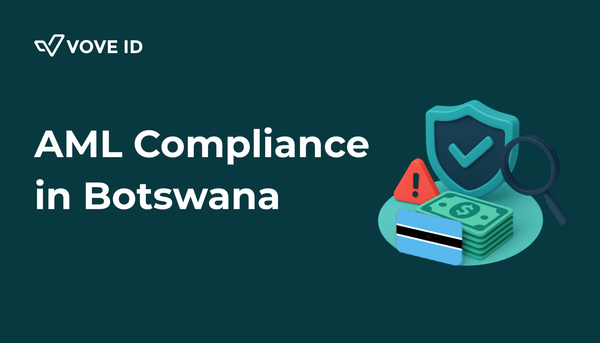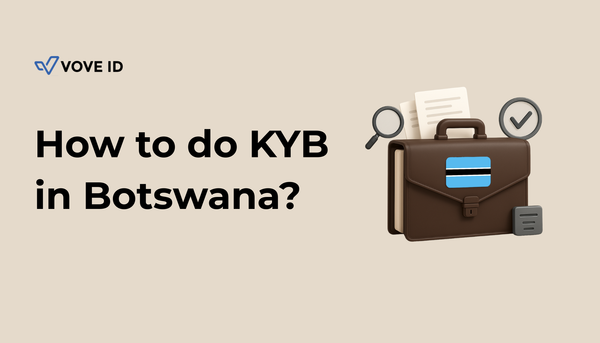KYC Compliance in Tunisia: A 2025 Guide for Digital Businesses
Navigate KYC compliance in Tunisia in 2025 with this guide. Learn about regulations, digital identity verification, and real-world examples to streamline fintech onboarding while staying compliant.

Introduction: The Growing Importance of KYC in Tunisia
Tunisia’s fintech sector is booming, driven by a push for financial inclusion and digital transformation. In 2025, Know Your Customer (KYC) compliance is a cornerstone for fintech startups, banks, and other regulated entities operating in this dynamic North African market. KYC ensures trust, mitigates fraud, and aligns with global Anti-Money Laundering (AML) standards, enabling businesses to onboard customers securely and efficiently.
This guide explores Tunisia’s KYC framework, regulatory requirements, challenges, and how digital solutions like eKYC are transforming compliance for fintechs and beyond. We’ll also share practical examples to illustrate how businesses are succeeding in this space.
Tunisia’s KYC Regulatory Framework
Tunisia’s KYC and AML regulations are primarily governed by:
- Organic Law No. 2015-26 (August 2015), amended by Organic Law No. 2019-9 (January 2019), aligning with FATF recommendations
- Central Bank of Tunisia (BCT) circulars, which outline specific KYC obligations for financial institutions, including fintechs and crypto platforms
These laws mandate Customer Due Diligence (CDD), Enhanced Due Diligence (EDD) for high-risk customers, ongoing transaction monitoring, and data retention for at least 10 years. Non-compliance can result in fines, license revocation, or reputational damage.
Key regulators:
- CTAF (Commission Tunisienne des Analyses Financières): Tunisia’s Financial Intelligence Unit (FIU), overseeing AML compliance and suspicious transaction reporting
- Banque Centrale de Tunisie (BCT): Supervises financial institutions and promotes fintech development
- Conseil du Marché Financier (CMF): Regulates capital markets and enforces investor protections
Core KYC Requirements in Tunisia
To comply with local regulations, businesses must implement a robust KYC process, including:
1. Customer Identification Program (CIP)
Verify customer identities using official documents such as:
- National Identity Card (CIN)
- Passport
- Driver’s license
- Residency card (for non-citizens)
For businesses, KYB checks must include:
- Business registration documents
- Verification of Ultimate Beneficial Owners (UBOs)
- Company management structure
2. Proof of Address
Acceptable documents include:
- Utility bills (dated within the past 3 months)
- Bank statements
- Government-issued residency confirmations
3. Risk-Based Due Diligence
- Standard CDD for low-risk individuals
- Enhanced Due Diligence (EDD) for higher-risk profiles like PEPs or customers from high-risk jurisdictions. EDD may involve collecting source-of-wealth documentation or conducting in-depth background checks.
4. Ongoing Monitoring and Record Keeping
- Monitor customer behavior and flag unusual patterns
- Retain KYC records for 10 years
- Submit suspicious transaction reports to CTAF within 10 days of detection
Compliance Challenges in Tunisia
Despite a strong legal framework, businesses face multiple hurdles:
- Limited ID penetration: According to the World Bank, more than 20% of rural Tunisians lack formal ID documents
- Cash-based economy: Over 60% of transactions still occur in cash, making digital traceability harder
- Manual onboarding: Traditional KYC methods lead to long onboarding times and higher operational costs
- Opaque corporate structures: Complex ownership trails complicate KYB verification for local SME
Digital KYC: A Path Forward
Digital identity verification is helping Tunisian fintechs improve compliance and customer experience. Technologies like biometric verification, OCR, and real-time AML screening offer faster, more secure onboarding.
Although its adoption remains limited in the private sector, it shows the country's growing commitment to digital identity infrastructure.
VOVE ID’s eKYC platform is already helping fintechs in similar environments onboard users securely without relying on national ID systems.
While integration with E-Houwiya is still evolving, many fintechs are turning to independent eKYC solutions that offer faster time-to-market and greater flexibility for remote onboarding.
Comparison: Traditional vs. Digital KYC
| Metric | Traditional KYC | Digital KYC (powered by VOVE ID) |
|---|---|---|
| Onboarding Time | 1–3 days | 5–15 minutes |
| Cost per Customer | $8–12 | $1–3 |
| Fraud Detection Rate | 60% | Up to 90% (biometric) |
| User Experience | High friction | Seamless and mobile |
Source: Industry benchmarks from Regula Forensics and AU10TIX
Emerging Trends in 2025
- AI-powered monitoring: Tools that analyze transaction data and detect synthetic fraud or deepfakes
- Perpetual KYC (pKYC): Continuous monitoring systems replace one-time checks
- Decentralized identity (DID): Blockchain-based credentials reduce redundancy
- Data privacy focus: Local civil society groups are pushing for updates to Tunisia’s outdated privacy framework in light of new digital ID initiatives
Why KYC Matters for Fintechs
With Tunisia’s fintech ecosystem projected to grow by 20% in 2025, KYC is more than a checkbox — it’s a driver of growth:
- Builds user trust through transparent onboarding
- Enables cross-border expansion by meeting global AML standards
- Prevents fraud through advanced verification technologies
- Supports regulatory compliance, especially as authorities increase supervision
Platforms like VOVE ID empower fintechs to reduce fraud, cut onboarding costs, and meet local compliance standards — even without full digital ID coverage.
Practical Tips for Compliance
- Choose an eKYC provider that supports biometric checks and document verification
- Keep onboarding flows mobile-friendly and API-driven
- Train staff regularly on red flags and CTAF requirements
- Use progressive profiling to reduce friction without sacrificing complianc
Final Thoughts
KYC compliance in Tunisia is evolving fast. Businesses that embrace digital onboarding and stay aligned with regulatory expectations will be best positioned to grow in 2025 and beyond.
To learn how VOVE ID supports secure and scalable eKYC across the MENA region, get in touch — our platform helps businesses verify identities efficiently, even in fragmented ID environments like Tunisia.




